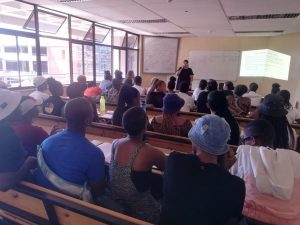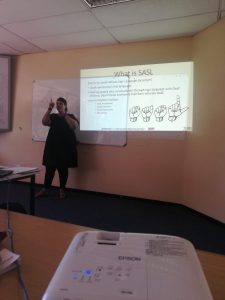Talisa Lalthapersad is the first junior South African Sign Language (SASL) lecturer to teach normal hearing students the basics of SASL as an elective module in their respective courses at the Durban University of Technology (DUT).
Lalthapersad (34) from Kharwastan in Chatsworth, Durban joined the DUT Deaf Centre in March 2023, servicing the General Education streams South African Sign Language. She feels it’s important for all South Africans to learn the basics of SASL, especially now after President Cyril Ramaphosa approved South African Sign Language as the 12th official language. She is working towards obtaining her Master’s Degree in IT.
Giving a brief background on herself, Lalthapersad revealed that she was born with congenital hearing loss and was diagnosed as being profoundly deaf at 12 months.
“That is how my journey began. My supportive parents enrolled me in a programme for hearing impaired children at the Carel Du Toit Centre in Cape Town. I attended this facility three times a year for intensive speech therapy which followed through with the same therapy in Durban. I attended a hard of hearing school from Grade R until matric. I have a genetic deafness in my family, my brother is also hearing impaired. I have very supportive and caring parents (normal hearing), who always provide me with security and a sense of belonging,” shared Lalthapersad.
Speaking about teaching hearing students SASL, Lalthapersad said she is enjoying every moment of it and feels it is for a good course. She finds it exciting to see the normal hearing students being so enthusiastic about learning the new language. She feels her lessons develop the students creative thinking and strengthen their communication skills.
“Learning SASL or any other language as an adult can be challenging. Initially, the students’ perception is that SASL is hard, this largely depends on what type of SASL one is trying to teach. Learning SASL is so important for normal hearing people if they plan to work or are working in public places such as government departments, banks, schools and many other places in order to communicate in sign language to the hearing impaired. It is such a valuable life skill when helping a deaf person,” explained Lalthapersad.
She shared her gratitude to her colleagues at the DUT Deaf Centre who are sign language interpreters who ensure effective communication between her and the students during her lessons.
In addition, Lalthapersad shared her excitement on the SASL being recently made the 12th official language. She indicated that this is a big win for the hearing impaired and the hard of hearing people as it will give them human dignity, promote their rights and inclusivity.
To learn SASL, Lalthapersad stated that one should take lessons where they will receive formal instructions as she is currently doing at DUT. An individual can learn SASL from three months basic language to three years in order to become fluent and an expert.
Sharing the highlight of her classes was hearing one of her students explaining how she managed to assist a deaf woman at a busy Durban taxi rank. The student saw the woman agitated and distressed while in a queue and intervened using her basic SASL skills to communicate with the woman and a taxi driver.
“This situation was solved immediately; the deaf woman thanked the normal hearing student from DUT for helping her understand what the taxi driver was saying to her and all of the misunderstandings that took place. The moral of the story is, it is important for all South Africans to learn the basics of SASL in order to help the deaf and hard of hearing people in situations such as this,” remarked Laltharpesad.
Pictured: Junior South African Sign Language (SASL) lecturer, Talisa Lalthapersad.
Pictures: Supplied.
Simangele Zuma



